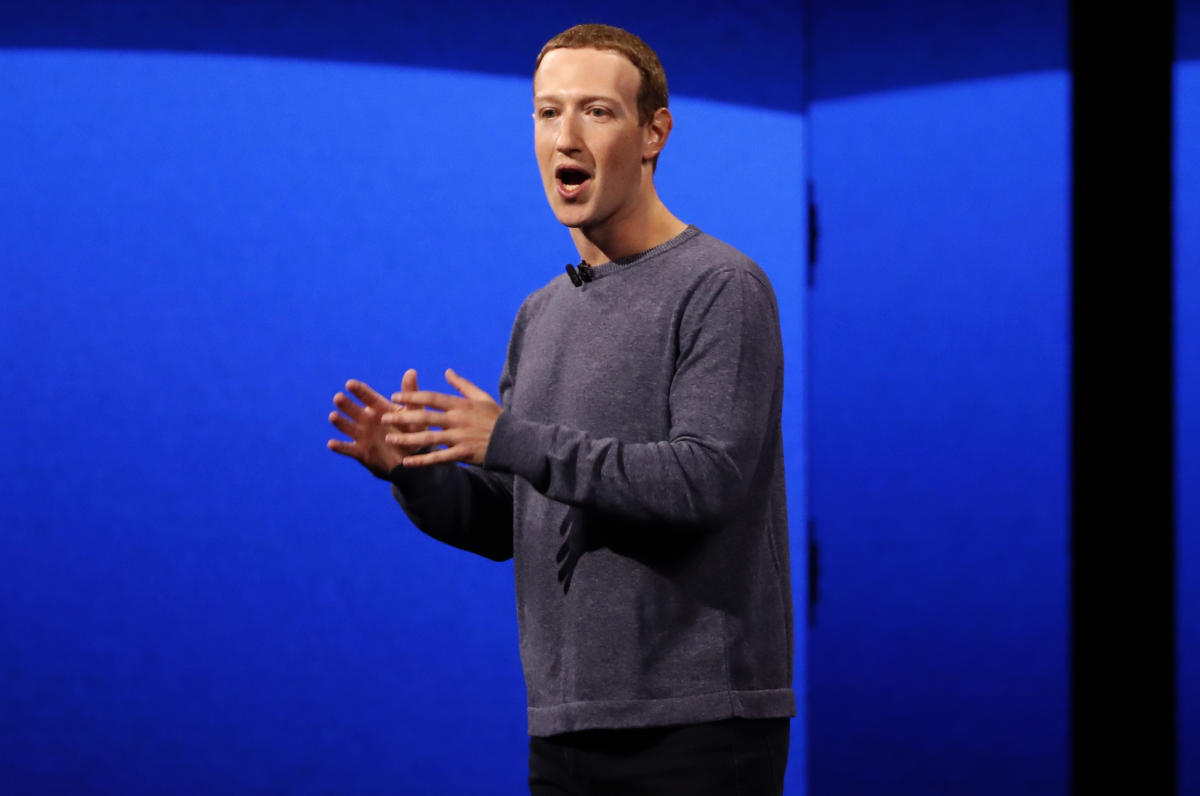SOCIAL
Mark Zuckerberg says AI boosts monetization by 30% on Instagram, 40% on Facebook

Meta (META) stock hit a new 52-week high on Thursday as investors celebrated the company’s return to revenue growth. One of the key drivers: artificial intelligence.
Further integration of A.I. helped drive Meta’s first revenue increase in three quarters, the company said on Wednesday. Reels monetization is up over 30% on Instagram and over 40% on Facebook on a quarterly basis as A.I. plays a larger role in the platforms.
Time spent on Instagram went up by 24% since Meta launched A.I.-powered Instagram reels.
“(Generative A.I.) is going to also help create more engaging experiences, which should create more engagement,” Meta Founder and CEO Mark Zuckerberg said on the company’s earnings call Wednesday evening. “And that by itself creates more opportunities for advertisers.”
In the first quarter, Meta delivered advertising revenue of $28.1 billion, above Wall Street estimates of $26.76. The company’s $2.20 earnings per share also topped analyst expectations of $2.01. Meta projects second quarter revenue in a range of $29.5 billion to $32 billion, above estimates of $29.48 billion.
The stock of the company, formerly known as Facebook, rose as much as 14% in intraday trading on Thursday.
A.I. is having its moment on tech earnings calls for the second consecutive quarter, following the widely popular launch of OpenAI’s ChatGPT in late November. But not every company has the same plans for the new technology.
Nvidia (NVDA) is selling A.I. powered supercomputers. Microsoft (MSFT) is integrating ChatGPT into its search engine to compete with Google (GOOGL), which has its own A.I. searchbot.
Meta’s approach is slightly different. The core business for Meta since the early days of Facebook has been advertising sales, which still account for 98% of the company’s quarterly revenue. So naturally, enhancing advertisements with A.I. is where Meta believes the new technology can be most impactful.
“We’re just playing a different game on the infrastructure than companies like Google or Microsoft or Amazon, and that creates different incentives for us,” Zuckerberg said when explaining why Meta is open-sourcing its A.I.
Meta’s push into A.I. comes as the company is still bleeding from its steep Metaverse investments. Meta’s Reality Labs reported an operating loss of $4 billion in the first quarter, compared to an operating loss of $3 billion in the same period last year.
Those losses had weighed heavily on Meta’s stock in the past, but amid Meta’s “year of efficiency,” cost-cutting efforts and A.I. benefits have Wall Street turning more bullish. In a note to clients on Wednesday, Deutsche Bank research analyst Benjamin Black highlighted AI-driven ad performance as a catalyst for accelerating revenue growth through the rest of 2023.
“The improvement in Meta’s (A.I. and machine learning) capabilities are not only improving Reels’ content ranking and recommendation algorithm, which in turn drives user engagement, but [it] also increases the efficiency of ad delivery, which increases monetization of the service,” Black wrote.
Zuckerberg noted on the earnings call he feels Meta is “no longer behind” in building out an A.I. infrastructure. Now, the focus shifts to finding new ways to integrate and optimize the technology.
“This is literally going to touch every single one of our products and services in multiple ways,” Zuckerbeg said. “This is just a very big wave and new set of technologies that’s available, and we’re working on it across the whole company.
Josh is a reporter for Yahoo Finance.
Click here for the latest stock market news and in-depth analysis, including events that move stocks
Read the latest financial and business news from Yahoo Finance
SOCIAL
Snapchat Explores New Messaging Retention Feature: A Game-Changer or Risky Move?

In a recent announcement, Snapchat revealed a groundbreaking update that challenges its traditional design ethos. The platform is experimenting with an option that allows users to defy the 24-hour auto-delete rule, a feature synonymous with Snapchat’s ephemeral messaging model.
The proposed change aims to introduce a “Never delete” option in messaging retention settings, aligning Snapchat more closely with conventional messaging apps. While this move may blur Snapchat’s distinctive selling point, Snap appears convinced of its necessity.
According to Snap, the decision stems from user feedback and a commitment to innovation based on user needs. The company aims to provide greater flexibility and control over conversations, catering to the preferences of its community.
Currently undergoing trials in select markets, the new feature empowers users to adjust retention settings on a conversation-by-conversation basis. Flexibility remains paramount, with participants able to modify settings within chats and receive in-chat notifications to ensure transparency.
Snapchat underscores that the default auto-delete feature will persist, reinforcing its design philosophy centered on ephemerality. However, with the app gaining traction as a primary messaging platform, the option offers users a means to preserve longer chat histories.
The update marks a pivotal moment for Snapchat, renowned for its disappearing message premise, especially popular among younger demographics. Retaining this focus has been pivotal to Snapchat’s identity, but the shift suggests a broader strategy aimed at diversifying its user base.
This strategy may appeal particularly to older demographics, potentially extending Snapchat’s relevance as users age. By emulating features of conventional messaging platforms, Snapchat seeks to enhance its appeal and broaden its reach.
Yet, the introduction of message retention poses questions about Snapchat’s uniqueness. While addressing user demands, the risk of diluting Snapchat’s distinctiveness looms large.
As Snapchat ventures into uncharted territory, the outcome of this experiment remains uncertain. Will message retention propel Snapchat to new heights, or will it compromise the platform’s uniqueness?
Only time will tell.
SOCIAL
Catering to specific audience boosts your business, says accountant turned coach

While it is tempting to try to appeal to a broad audience, the founder of alcohol-free coaching service Just the Tonic, Sandra Parker, believes the best thing you can do for your business is focus on your niche. Here’s how she did just that.
When running a business, reaching out to as many clients as possible can be tempting. But it also risks making your marketing “too generic,” warns Sandra Parker, the founder of Just The Tonic Coaching.
“From the very start of my business, I knew exactly who I could help and who I couldn’t,” Parker told My Biggest Lessons.
Parker struggled with alcohol dependence as a young professional. Today, her business targets high-achieving individuals who face challenges similar to those she had early in her career.
“I understand their frustrations, I understand their fears, and I understand their coping mechanisms and the stories they’re telling themselves,” Parker said. “Because of that, I’m able to market very effectively, to speak in a language that they understand, and am able to reach them.”Â
“I believe that it’s really important that you know exactly who your customer or your client is, and you target them, and you resist the temptation to make your marketing too generic to try and reach everyone,” she explained.
“If you speak specifically to your target clients, you will reach them, and I believe that’s the way that you’re going to be more successful.
Watch the video for more of Sandra Parker’s biggest lessons.
SOCIAL
Instagram Tests Live-Stream Games to Enhance Engagement

Instagram’s testing out some new options to help spice up your live-streams in the app, with some live broadcasters now able to select a game that they can play with viewers in-stream.
As you can see in these example screens, posted by Ahmed Ghanem, some creators now have the option to play either “This or That”, a question and answer prompt that you can share with your viewers, or “Trivia”, to generate more engagement within your IG live-streams.
That could be a simple way to spark more conversation and interaction, which could then lead into further engagement opportunities from your live audience.
Meta’s been exploring more ways to make live-streaming a bigger consideration for IG creators, with a view to live-streams potentially catching on with more users.
That includes the gradual expansion of its “Stars” live-stream donation program, giving more creators in more regions a means to accept donations from live-stream viewers, while back in December, Instagram also added some new options to make it easier to go live using third-party tools via desktop PCs.
Live streaming has been a major shift in China, where shopping live-streams, in particular, have led to massive opportunities for streaming platforms. They haven’t caught on in the same way in Western regions, but as TikTok and YouTube look to push live-stream adoption, there is still a chance that they will become a much bigger element in future.
Which is why IG is also trying to stay in touch, and add more ways for its creators to engage via streams. Live-stream games is another element within this, which could make this a better community-building, and potentially sales-driving option.
We’ve asked Instagram for more information on this test, and we’ll update this post if/when we hear back.
-

 SEARCHENGINES6 days ago
SEARCHENGINES6 days agoGoogle Core Update Volatility, Helpful Content Update Gone, Dangerous Google Search Results & Google Ads Confusion
-

 SEO6 days ago
SEO6 days ago10 Paid Search & PPC Planning Best Practices
-

 MARKETING7 days ago
MARKETING7 days ago2 Ways to Take Back the Power in Your Business: Part 2
-

 MARKETING5 days ago
MARKETING5 days ago5 Psychological Tactics to Write Better Emails
-

 SEARCHENGINES5 days ago
SEARCHENGINES5 days agoWeekend Google Core Ranking Volatility
-

 MARKETING6 days ago
MARKETING6 days agoThe power of program management in martech
-

 PPC7 days ago
PPC7 days agoCritical Display Error in Brand Safety Metrics On Twitter/X Corrected
-

 SEO5 days ago
SEO5 days agoWordPress Releases A Performance Plugin For “Near-Instant Load Times”











